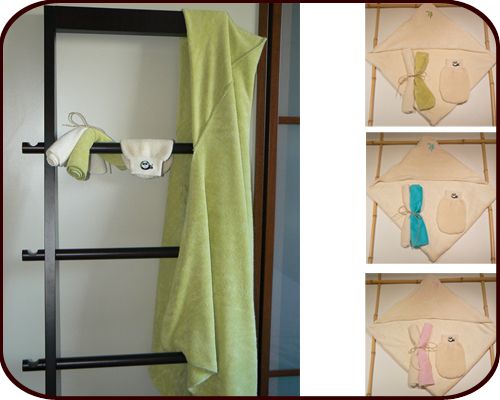Bamboo Bath Wrap

Product Description
Peek a Green's Bamboo Bath Wrap has been featured on the famous blog Cool Mom Picks.
This gift set includes:
-1 hooded towel from Bamboosa made in the USA from 80% viscose from organic bamboo and 20% recycled polyester.
Size = 30 x 30 Age = Newborn+
Color = Select Green with natural bamboo leaves, Natural with green bamboo leaves, Natural with blue bamboo leaves, or Natural with pink bamboo leaves.
-1 set of 2 washcloths from Bamboosa made in the USA from 80% viscose from organic bamboo and 20% recycled polyester.
One size, Colors are matching hooded towel = Natural + Green, Natural + Blue, or Natural + Pink.
-1 kid wash mitt with panda from Bamboosa made in the USA from 80% viscose from organic bamboo and 20% organic cotton.
One size, Color = Natural

Plant a Tree Program
This gift set qualifies for 3 items = 3 trees planted.
Gift Wrapping
All our gift sets are wrapped in 100% recycled kraft and tissue papers and tied with raffia or hemp twine. You can add a gift message during checkout.
Why Bamboo is Perfect for a Baby's Sensitive Skin and the Environment?
-Naturally organic: Bamboo is grown without pesticides and fertilizers.
-Sustainable: Bamboo is arguably the most renewable resource on our planet. It has an extensive rooting system and needs little water, growing 4 to 6 new shoots per year. It is, in fact, considered to be the fastest growing plant in the world.
-Eco-friendly: Bamboo absorbs nearly 5 times the amount of greenhouse gases and produces 35% more oxygen than the same amount of trees. It is critical in the fight to end global warming. Bamboo is rain-fed only and helps to reduce soil erosion. It is a grass, so it regenerates without the need for replanting.
-100% biodegradable: Bamboo fiber comes from nature and it returns entirely to nature in the end.
-Absorbent: Bamboo is highly absorbent and wicks water away from the body 3 to 4 times faster than cotton. In warm, humid weather, bamboo clothing helps keep baby drier, cooler, and more comfortable. Another advantage is that bamboo fabric doesn't stick to the skin. Bamboo fiber and fabric require less dye than 100% cotton fabric because bamboo has a better absorbency than conventional cotton.
-Breathable and thermo-regulating.
-Antibacterial: Bamboo is naturally anti-bacterial and anti-fungal presumably because of a bacteriostasis agent unique to bamboo plants called, "bamboo kun," which also helps bamboo resist harboring odors.
UV resistant: Bamboo fiber does have natural UV protection. According to the Suncare Research Laboratories, the UPF label rate is 15. The 100% bamboo fabric scored 18.3 on the UPF scale with 94.15% UVA block and 93.17% UVB block.
-Hypoallergenic: Bamboo's organic and natural properties make it non-irritating to a baby's sensitive skin.
-Luxuriously soft: It is often compared to silk or cashmere, but easier to clean (washer and dryer safe). The fibers won't peel, making it safer for babies.
Why Organic Cotton is Better than Conventional Cotton?
-No chemicals: Organic cotton is grown without pesticides and fertilizers, unlike conventional cotton, which uses 25% of the world's insecticides and 10% of the world's pesticides. For instance, it takes roughly a third of a pound of pesticides and fertilizers to grow enough cotton for just one T-shirt.
-Better for human health: Organic farming prevents farmers and the local population from being exposed to hazardous chemicals. The Environmental Protection Agency (EPA) considers 7 of the top 15 pesticides used on cotton in the year 2000, in the United States, as "possible", "likely", "probable", or "known" human carcinogens.
-Better for the environment: Organic farming prevents soil erosion, protects air and water quality for plants and animals, and preserves species biodiversity through crop rotation.
-Safer product especially for a baby's sensitive skin: Clothing or toys made from organically grown cotton are free of much of the harmful chemical content present in conventionally grown cotton. Bleaches, formaldehyde, and other chemical finishes are also used in non-organic textile manufacturing. Even after washing a cotton shirt many times, chemical traces remain.



